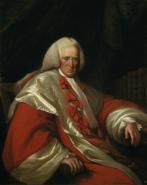
Lord Kames states that the “hoarding appetite” is part of human nature and that it is the foundation of our notion of property rights (1779)
About this Quotation:
Like Adam Smith, a fellow member of the Scottish enlightenment, Lord Kames believes that the “hoarding instinct” is innate and that even children and bees (compare Bernard Mandeville) have a sense of “mine and thine”. This is the powerful natural origin of property rights in human society.
Other quotes from this week:
- 2009: Frédéric Bastiat on the state as the great fiction by which everyone seeks to live at the expense of everyone else (1848)
- 2007: William Graham Sumner reminds us never to forget the “Forgotten Man”, the ordinary working man and woman who pays the taxes and suffers under government regulation (1883)
- 2007: Lord Macaulay writes a devastating review of Southey’s Colloquies in which the Poet Laureate’s ignorance of the real condition of the working class in England is exposed (1830)
- 2007: Thomas Clarkson on the “glorious” victory of the abolition of the slave trade in England (1808)
- 2005: Edmund Burke asks a key question of political theory: quis custodiet ipsos custodes? (how is one to be defended against the very guardians who have been appointed to guard us?) (1756)
Other quotes about Property Rights:
- 2009: James Mill on the natural disposition to accumulate property (1808).
- 2008: Lysander Spooner spells out his theory of “mine and thine”, or the science of natural law and justice, which alone can ensure that mankind lives in peace (1882)
- 2008: Sir William Blackstone argues that occupancy of previously unowned land creates a natural right to that property which excludes others from it (1753)
- 2008: Alexis de Tocqueville stood up in the Constituent Assembly to criticize socialism as a violation of human nature, property rights, and individual liberty (1848)
- 2007: Thomas Hodgskin argues for a Lockean notion of the right to property (“natural”) and against the Benthamite notion that property rights are created by the state (“artificial”) (1832)
- 2007: J.B. Say on the self-evident nature of property rights which is nevertheless violated by the state in taxation and slavery (1817)
- 2004: Wolowski and Levasseur argue that Property is “the fruit of human liberty” and that Violence and Conquest have done much to disturb this natural order (1884)
- 2004: John Taylor on how a “sound freedom of property” can destroy the threat to Liberty posed by “an adoration of military fame” and oppressive governments (1820)
10 March, 2008
 | Lord Kames states that the “hoarding appetite” is part of human nature and that it is the foundation of our notion of property rights (1779) |
Henry Home, Lord Kames, a leading figure of the Scottish Enlightenment, argued in Essays on the Principles of Morality and Natural Religion (1779) that the "hoarding appetitie" was universal among mankind and that it was the basis of the idea of property rights:
A relation is formed betwixt every man and the fruits of his own labour, the very thing we call property, which he himself is sensible of, and of which every other is equally sensible. Yours and mine are terms in all languages, familiar among savages, and understood even by children. This is a fact, which every human creature can testify.
The full passage from which this quotation was taken can be be viewed below (front page quote in bold):
The compass I have taken is wide, but the shortest road is not always the smoothest or most patent. I come now to the point, by putting a plain question, What sort of creature would man be, endued as he is with a hoarding appetite, but with no sense or notion of property? He hath a constant propensity to hoard for his own use; conscious at the same time that his stores are no less free to others than to himself;—racked thus perpetually betwixt the desire of appropriation, and consciousness of its being in vain. I say more: the hoarding appetite is an instinct obviously contrived for assisting reason, in moving us to provide against want. This instinct, like all others in the human soul, ought to be a cause adequate to the effect intended to be accomplished by it. But this it cannot be, independent of a sense of property. For what effectual provision can be made against want, when the stores of every individual are, without any check from conscience, left free to the depredations of the whole species? Here would be a palpable defect or inconsistency in the nature of man. If I could suppose this to be his case, I should believe him to be a creature made in haste, and left unfinished. I am certain there is no such inconsistency to be found in any other branch of human nature; nor indeed, as far as we can discover, in any other creature that is endued with the hoarding appetite. Every bee inhabits its own cell, and feeds on its own honey. Every crow has its own nest; and punishment is always applied, when a single stick happens to be pilfered. But we find no such inconsistency in man. The cattle tamed by an individual, and the field cultivated by him, were held universally to be his own from the beginning. A relation is formed betwixt every man and the fruits of his own labour, the very thing we call property, which he himself is sensible of, and of which every other is equally sensible. Yours and mine are terms in all languages, familiar among savages, and understood even by children. This is a fact, which every human creature can testify.